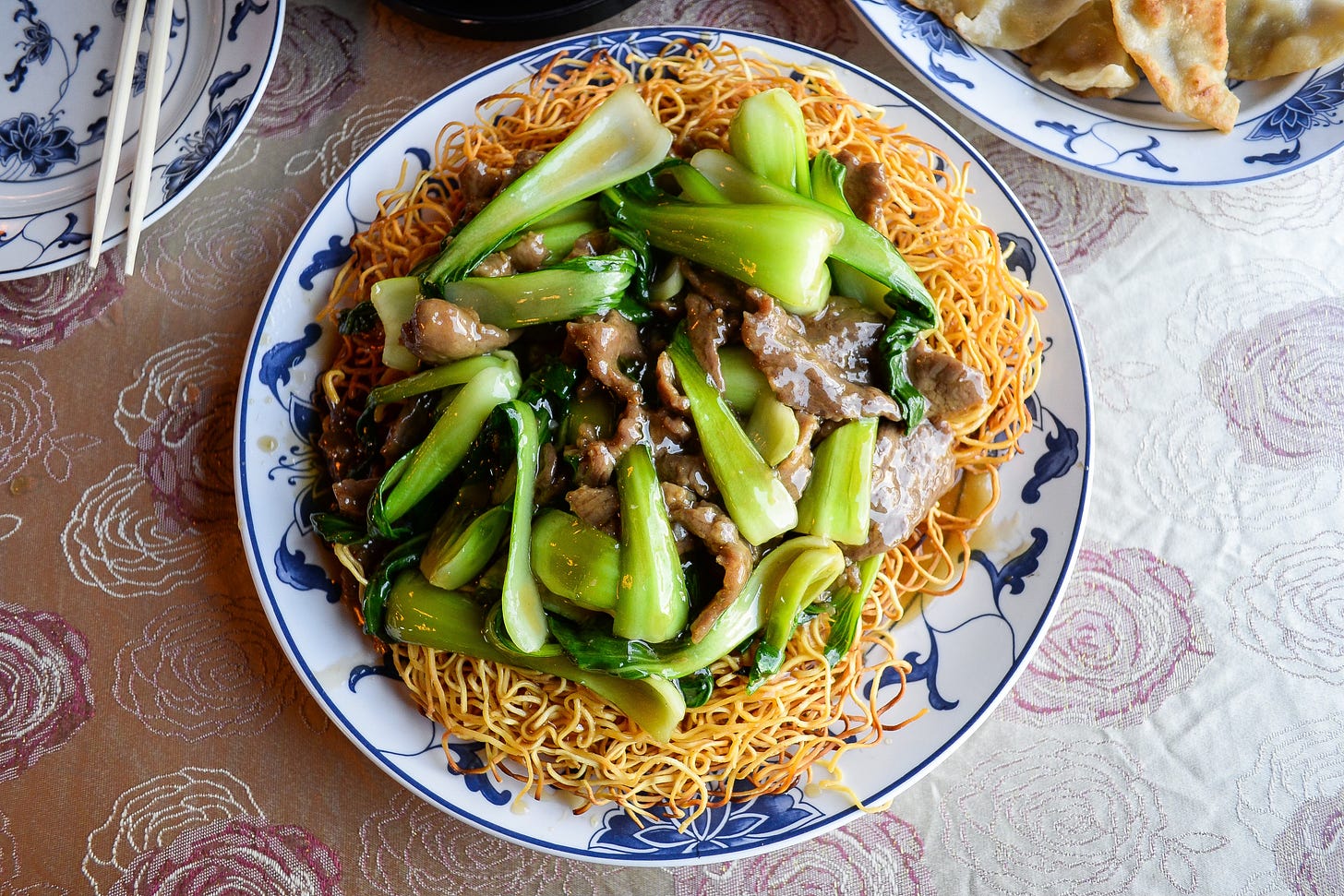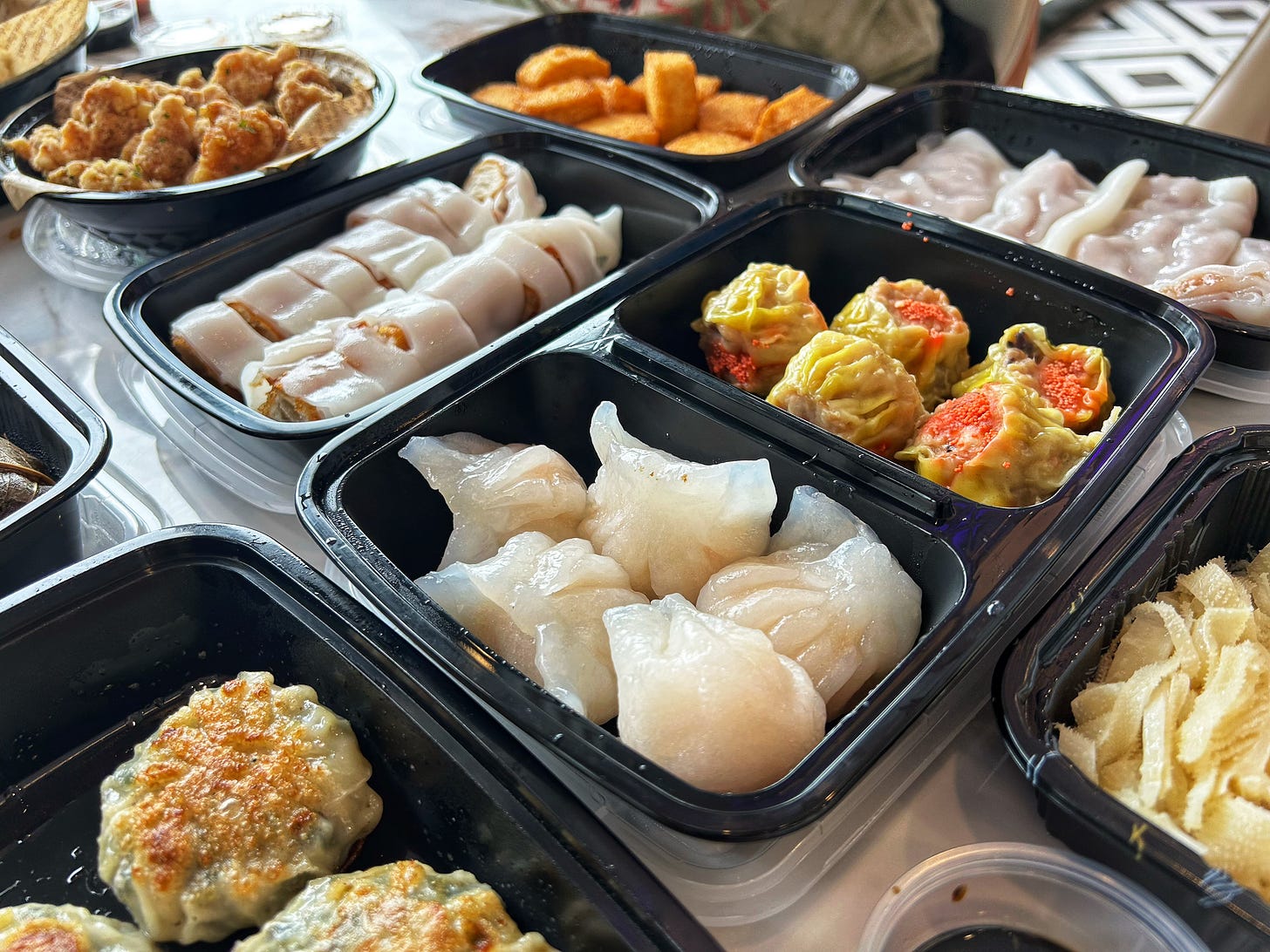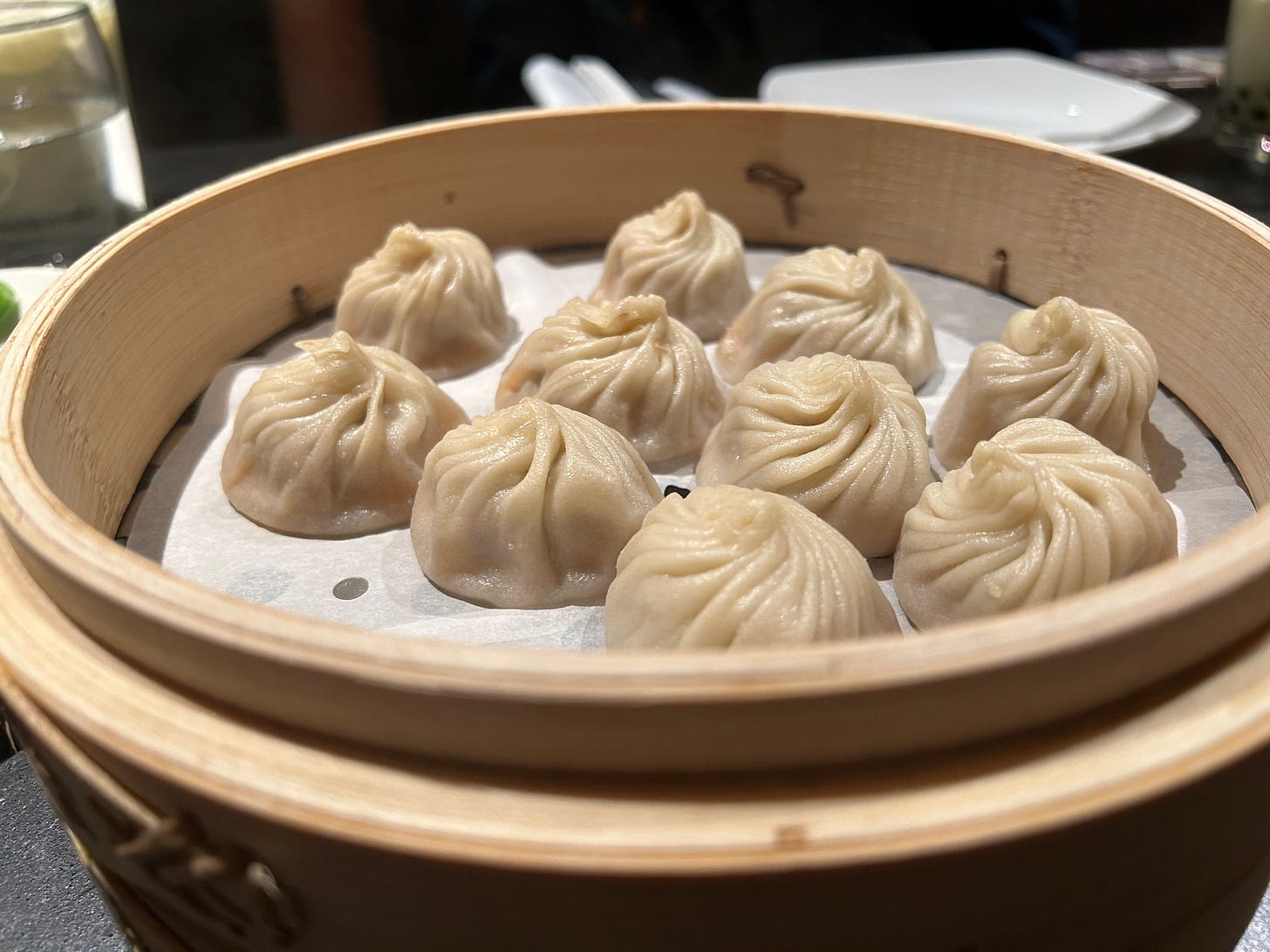Mismatched Expectations, Quantifying Joy in Food, Idolization in Food Media.
50% of my post is about Yelp.
Yelp - what is it good for?
I can find decent restaurants no matter how bad the reviews are, because it’s determined by the details the reviewer provided, and not their thoughts. Let me elaborate.
When I moved to Atlanta 14 years ago, I did what most people usually do when trying to familiarize onesself with their surroundings - check Yelp for restaurant recommendations. At the time, Eater and Infatuation hadn’t set foot in ATL yet, and Tripadvisor was a bit out of touch (I mean, it always has been, unless you’re looking for the best Applebee’s in the area). I was also taking care of a baby at home, living in what I called Atlanta to my NY-based friends and family, but Marietta when talking to Atlantans. And as a Gen X-er, I had very little knowledge of social media (shocking, I know) and only joined Instagram in 2017 with the goal of growing my following to bring them to my (now defunct) blog.
So, one day in the year 2011, I had a craving for dim sum and went to Yelp to see what was in the area. Canton House was at the top of the Yelp list with the most reviews. One of the most recent reviews was from a woman giving it 1 star because her tea had leaves in it.
I guess everyone’s villain origin story is unique, and this was mine.
The most critical reviews came from people who seemed inexperienced with dim sum, or Chinese food in general, from what I read on those reviews. Rather than using this moment to become a keyboard warrior, I went to Canton House. The food was good back then - not the best, not the worst, surely not deserving of the one star it got from mismatched expectations.
Mismatched expectations are when someone expects one thing but gets another. And rather than understand they were anticipating something that didn’t exist at this restaurant, it’s considered straight up wrong, therefore a bad experience. In this case, the woman was upset her tea had leaves in it, not understanding that loose leaves are typically used to steep the tea and not in bags, nor are they filtered out. They simply end up on the bottom of each person’s teacup, which is the norm and perfectly acceptable. Nothing is considered “wrong” when it’s done this way, yet was written as “wrong” so matter-of-factly, anyone not experienced in Chinese food (or tea, in this matter) would read it as fact.
That same reviewer also deemed the HK pan-fried noodles were inconsistent because the noodle “cake” was crispy on the outside and soft on the inside, when almost every Cantonese person would know this is exactly how it should be done. You get the best of both worlds when it’s prepared this way, because textural contrast is (gasp) not actually a bad thing.
Both the tea and the noodles were clear signs this was a legit Chinese restaurant, no matter how ignorant the reviewer was. And this is how I‘ve read all reviews (especially on Yelp), not by the rating they give or their preferences, because when you trudge through all the muck, you can start finding some decent restaurants there.
Here are a few more examples of one-star reviews I’ve read before I move on - mostly because I need to get these off my chest.
Example 1: A customer walks into a Lanzhou Ramen restaurant, gets angry it tastes nothing like Japanese ramen, writes a scathing 1-star review telling people there’s better Japanese ramen out there. Lanzhou Ramen specializes in lamian (hand-pulled noodles), and the word is interchangeable with ramen, which originated from the previous name. Comparing Lanzhou ramen to Japanese ramen is like comparing apples to oranges.
Example 2: Customer goes to a dim sum restaurant, orders xiao long bao, writes about their poor experience with authentic dim sum, not understanding that XLBs are a Shanghainese specialty and dim sum is of Cantonese origin, which is like a foreigner reviewing New York pizza in California.
Example 3: A smash burger was too thin, customer expected a thicker patty. The name itself should give enough information for the customer to assume the patty is smashed, therefore thin, but once again the preference for something totally different is what determines whether the burger was good or bad for the customer. Execution and flavor are not mentioned.
Example 4: Tex-Mex restaurant didn’t offer “authentic” Mexican food. Again, the term “Tex-Mex” should lead a customer to understand this shouldn’t be in the same category as “authentic” Mexican food. I don’t have time to even talk about the word authentic here; that’s for another post.
Example 5: Food was too spicy for a customer’s palate, therefore inedible. This happens when a chef is unapologetic for their culture’s spices, not watering it down for the masses to make it more palatable. Entitlement trumps everything, as chefs are blamed when they aren’t sensitive to every individual’s spice tolerance.
Example 6: Northern Chinese dumplings have too thick of a skin, therefore deemed not acceptable because they are compared to the thinner dumplings skins of Cantonese dumplings or Japanese Gyoza. Northern Chinese dumplings are thicker-skinned to withstand boiling, while Southern dumpling wrappers are delicate because they are steamed. Thick-skinned does not equate to sloppy preparation but rather for different cooking methods.
These examples aren’t to attack a particular individual but to shine a light onto bad reviews that don’t really prove the restaurant was bad, so put the (pitch)forks down. They all led me to restaurants that have been in my rotation for years.
So those were the worst of the worst subjective food takes. What about looking at food objectively?
While Yelp is invaluable for having such a huge database of restaurants, they are not curated, consisting of a huge range of wildly different preferences and levels of knowledge. Most of it being a sea of subjective takes.
I don’t believe that we should trust any single person’s preferences because we all have some degree of mismatched expectations, no matter our experience. I surely don’t want to be held accountable by my preferences, no matter my level of expertise, with the exception of mistakes in my objective takes. Each person’s preference is unique, with varying experience/knowledge within a restaurant’s cuisine, the time they went, the chef, and/or quality of service. I’ve received many DMs saying my suggestion was horrible because it wasn’t in line with their experience. There is no way I can ensure someone has the same experience as I had, nor should a reader expect that.
That brings my discussion to objective food takes - reviews based on facts and not preferences.
Personally, I find creating criteria, indexes, and rating systems that determine whether food is good to be stressful when the whole point is to make it not stressful, because it allows all these factors to affect your decision, whether your taste buds actually give a shit. The Shanghai Soup Dumpling Index is a good example of this. Do they have merit? Yes…although the merit lies in the meticulous “quantitative interpretation of the colloquial standards for a well-constructed soup dumpling,” as the inventor of the index explains. I appreciate the science behind the perfect ratio of wrapper to filling, how thin it can be before breaking, how much soup can be cradled in each dumpling, and what is considered perfection to the majority of dumpling lovers.
But the appreciation occurs only in the occasional need for a mental exercise, in order to distract from the mundaneness of everyday life and food. At the end of most days, my appetite, company, what netflix show I’m watching if I’m eating solo, dictate whether I have an enjoyable experience, as humans normally do not eat in a completely sterile environment without distractions like a scientist running an experiment.
Eating is a visceral experience, and we’re trying to make it not one. Separating objective and subjective takes, while sort of possible on paper, is impossible within ourselves. Indexing takes the joy out of food, and puts the joy into the indexing. The irony is, when trying to quantify joy so others can experience it, we correlate what is ‘correct’ to what is ‘delicious’. Because being rational and logical means we’re more evolved than our ancestors. While that works in other aspects of our lives (like to prevent us from road raging when someone cuts us off), eating should not be one of them. It is one of the few things we have left that brings us joy.
Did I just say both takes were bad?
No. We can put aside what’s deemed good or bad, because we’re valuing the details here, not the message. We tend to lean towards objective takes since people’s preferences and opinions are all over the place, but they can take the joy out of eating. Putting aside good and bad when reading about food is beneficial in searching for enjoyable experiences.
Idolization in Food Media.
Celebrities are created within every niche (entertainment, music, art, food, etc.), put on a pedestal, their words and actions valued above others. I don’t want to get philosophical or dive into religion here, but the parallels of idolization in religion and everyday life do exist. It’s something ingrained in a lot of people and shows a fundamental difference in how we read and understand the world, and in this case, food reviews. The more we idolize celebrity chefs, publications, writers, influencers, indexes, lists, the less we focus on what they’re trying to communicate to us, preventing us in learning from them in order to come to our own conclusions, and instead, simply take their word as fact.
You know who I trust more? The people who tell me to trust myself, not the people who tell me to trust them. Blasphemous, I know. Any person or group telling you to trust them more than yourself, has a motive - money or power. That’s not to say all motives are malicious; people need to make a living. Although some just want to be idolized or respected, manipulating you into believing you can’t trust your own opinions and need to rely on them, so I guess in that case it’s pretty malicious.
Anyway, going to try to reel everything in for my last paragraph. I’ve been unsure of how to end my post for two days. Mismatched expectations are everywhere but can still be helpful in finding decent restaurants. Food shouldn’t always be served with a mental exercise side dish. Nobody can gaslight you into thinking what you enjoy isn’t delicious. I’m running out of things to say. Have a good Wednesday, everyone.
(It’s summer, my kids are home, my brain isn’t squeezing out enough juice, thoughts are jumbled, I’ve been writing this in increments for days, so forgive me for not being as articulate as I could be. Something that makes sense in my head might not read well for you, and I apologize.)






